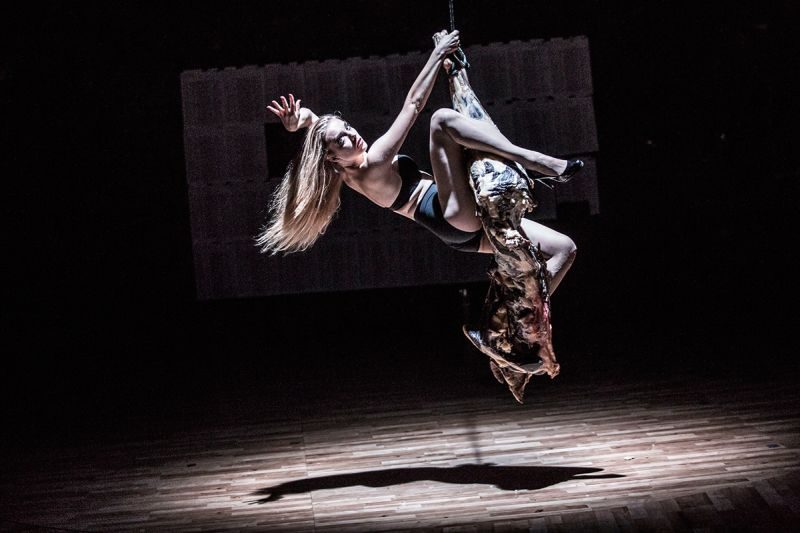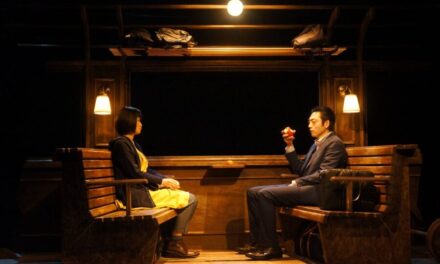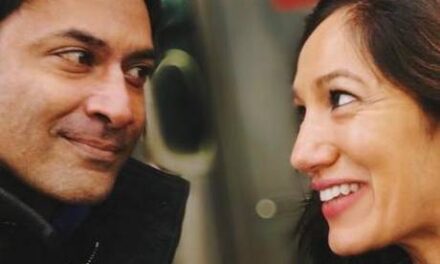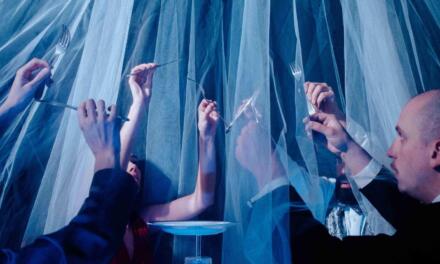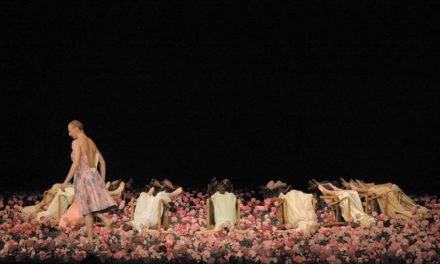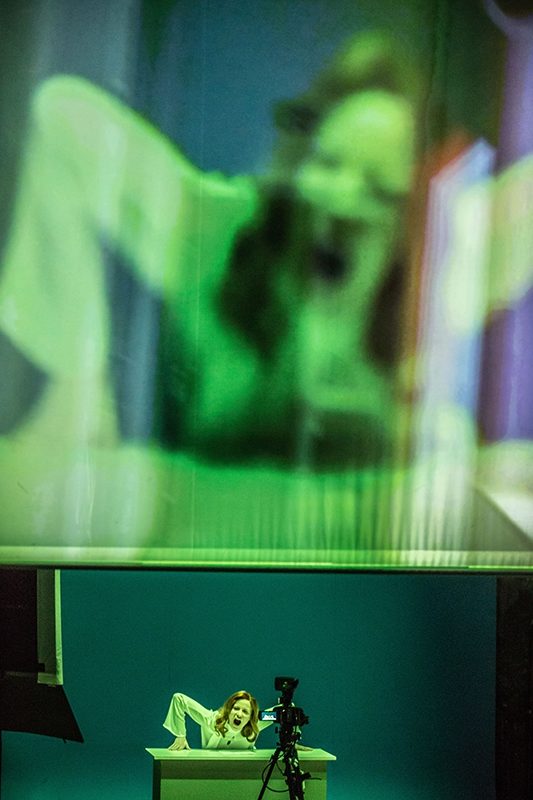
From The Rage, directed by Maja Kleczewska, at Divine Comedy Festival 2017, ICE Kraków — Sala Teatralna. Photo credit of Teatr Powszechny.
Divine Comedy Festival 2017 situates itself awkwardly around the peaceful Christmas Market in the Main Square, Krakow. The 2017 festival, provocatively themed “Theatre in Ruin,” embodies an unusually rebellious, angry, yet still divine spirit in response to the tumultuous political situation in Poland. Artists have responded violently, directly and confrontationally via the broadest possible range of theatrical forms and media. Given that Divine Comedy is one of the biggest mainstream theatre festivals in Poland, it stunned me that almost every show I saw was a hardcore political theatre piece, desperately and fearlessly trying to find an answer with audiences and to provoke awareness in the face of political apathy. This is something remarkable and unique about Polish theatre, which has no problem dealing with difficult topics and making viewers quiver with uneasiness. Jan Klata’s Wedding as the opening of the festival sparked a roaring ovation in Stary Teatr (The Old Theatre), followed by a protest both on the stage and in the auditorium against the new government’s intervention of artistic freedom and integrity (Jan Klata, the former artistic director of the Old Theatre, was recently replaced for no legitimate reason). The energy in the theatre was unbelievably real, powerful and immediate. The urgency of expression and of doing theatre fully manifested itself in this moment of collectivity with the reverberating sounds of roaring, stamping and clapping.
The Rage (WŚCIEKŁOŚĆ in Polish), directed by Maja Kleczewska, is one of the most political, wildest, and angriest pieces in the festival and was written by Elfriede Jelinek, the Austrian Nobel Prize laureate, shortly after the shooting at the offices of Charlie Hebdo. The play consists of a collage of scenes that directly or indirectly respond to the concept of Otherness—more specifically, to the Syrian refugee crisis. It is especially uncomfortable for Polish audiences since, alongside Hungary and Austria, Poland is one of the three EU countries that have not relocated a single refugee. “Poland cannot accept refugees,” says Prime Minister Beata Szydło.
As audience members walk into the theatre, two huge projection screens show a real conservative TV show (in real time) and some interviews with locals conducted in a former black market near Krakow. It is difficult to describe what’s happening on the stage linearly since it deliberately lacks narrativity and a conventional dramatic arc. Instead, the piece flows like a haunting nightmare of fragmented moments of terror, the grotesque and the ridiculous. An actress playing Europa consumes many hamburgers in front of a camera pornographically and later eats and dances frenetically with an animal body with real raw meat on it. A black-faced actor holding a black doll shouts at the audience desperately. A conversation between two girls about beheading repeats itself over and over and over again until the overbearing soundscape cancels out the semantic meaning of their words.
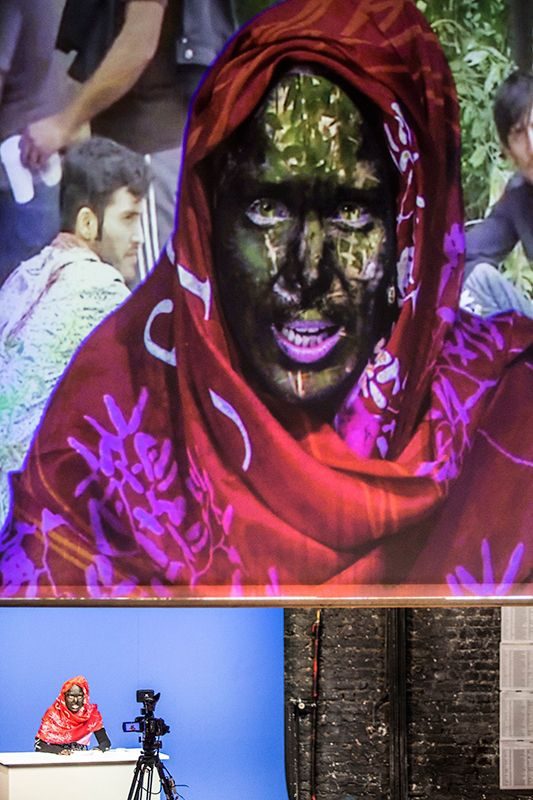
From The Rage, directed by Maja Kleczewska, at Divine Comedy Festival 2017, ICE Kraków — Sala Teatralna. Photo credit of Teatr Powszechny.
Kleczewska sadistically and manipulatively uses the cameras to generate doubled and tripled expressions of victims and perpetrators. A dramaturgy of excess overloads the stage. More than five or seven actions sometimes coexist, with no apparent focus. This nightmare is a like a blurry old memory that tucks itself in our collective unconsciousness but flares up uncontrollably in Kleczewska’s theatrical terrain. A blurred landscape of humanity. The flooding information cannot possibly be processed and disused entirely. The sense of overwhelming disorientation in the face of the excess resembles our daily experiences when turning on the TV or scrolling through our social media feeds, trying to understand what’s going on in this world but in vain because of the swamping footage and news of terror and fear. Then, we turn to oblivious mode, whether it’s Netflix or cute animal videos. The Rage exposes our collective guilt and ineptness as the privileged ones who still have the option of attending theatre on the so-called refugee crisis. Who are we artists? Who are your audiences? What can we do, and what are we doing right here and right now, when terrible things are still happening at the same time? The tragedy of The Rage lies not in its depiction of rootless refugees or hateful xenophobics, but in its self-reflective acknowledgment of theatre’s limitation as a forum for political change. Kleczewska recalled during a Q&A session that an audience member bluntly remarked, “I just don’t care about them. I just don’t care about refugees.”
The festival’s artistic director, Bartosz Szydłowski, wrote in his welcome letter, “At this festival, we present a dangerous theatre: precisely the theatre that exposes and discredits the mechanisms of power; the theatre that stands against taboos to reveal mythologized images and get us out from the comfort zone of our groves. The theatre of 2016/17 intends to speak in the name of the community, to elicit a joint scream. THE NEW POLISH THEATRE claims dominion over souls! Will it succeed? Can this be done at all?” The Rage asks the very question Szydłowski poses: Can theatre succeed in its divine mission? Or it is merely pretending and preaching to likeminded people with no possibility of reaching out to the other side? How does theatre, especially institutionalized theatre, position itself when grappling with difficult issues like a refugee crisis? Is there any way to avoid being patronizing from an inherently privileged standpoint as theatre artists from relatively untroubled and well-to-do countries?
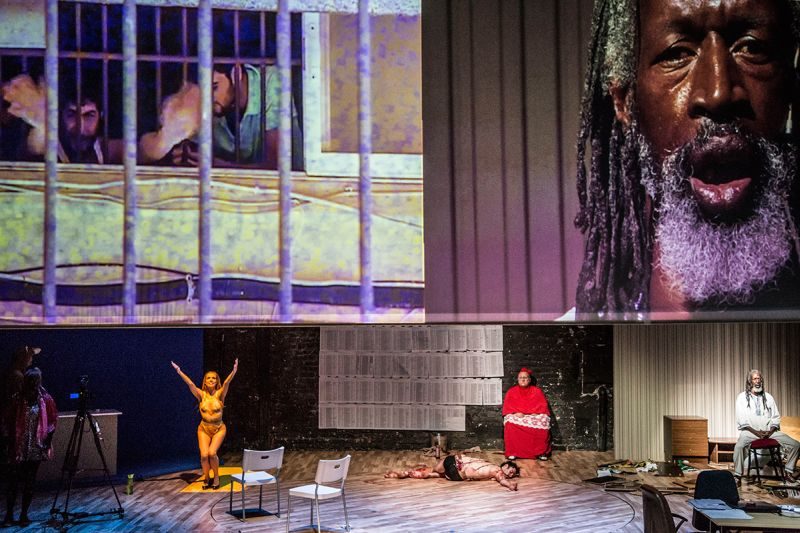
From The Rage, directed by Maja Kleczewska, at Divine Comedy Festival 2017, ICE Kraków—Sala Teatralna. Photo credit of Teatr Powszechny.
The Rage exposes the vulnerability of theatre and of art in general, questioning its legitimacy, function, and intention. Kleczewska and her dramaturg, Łukasz Chotkowski, devise a brilliant intermission where an excessively long monologue goes on and on, and then an actress holds a sign saying something like “you can leave now to use the bathroom.” The monologue, which complaints about people’s inability to listen, continues while most of the audience members are leaving the theatre (the show never stops during the intermission). It is a real moment of theatre itself, crying out its failure in communicating its messages. Kleczewska’s postdramatic piece is indeed a theatre in ruins, where anarchy of form dominates, and all the binaries–real/fictitious, us/them, good/evil–collide. The artist’s rage at theatre’s condition is palpable, and audiences’ nonchalance is cruel. But The Rage offers no irreversible answer nor pessimistic view. There is hope buried under the theatrical rubble.
A special report on Divine Comedy Festival was prepared with support of the Adam Mickiewicz Institute – the national institution of the culture of Poland. To learn more about polish theatre go to http://culture.pl/en/category/performance
This post was written by the author in their personal capacity.The opinions expressed in this article are the author’s own and do not reflect the view of The Theatre Times, their staff or collaborators.
This post was written by Kai-Chieh Tu.
The views expressed here belong to the author and do not necessarily reflect our views and opinions.

